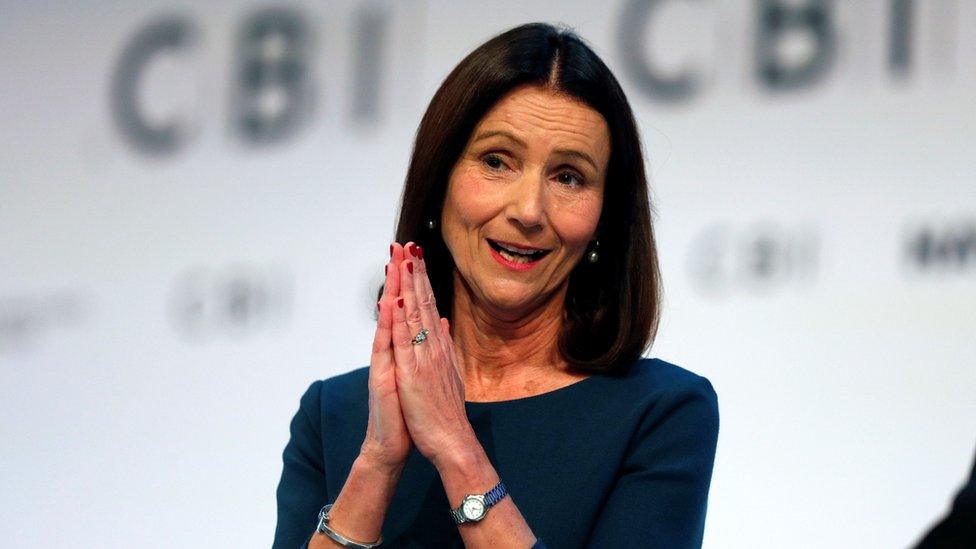Business, bedfellows, Brexit and Boris
- Published
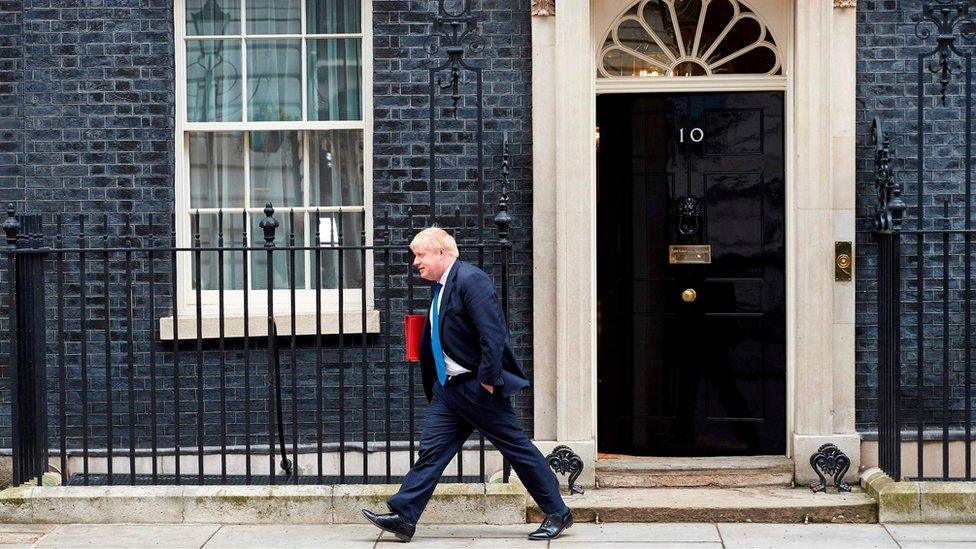
Creating divisions: Boris Johnson
Markets have priced in uncertainty from Brexit and constitutional crisis, but the costs keep coming for business, and they're getting really fed up about it.
There are upsides. Whisky exports boomed in the early part of this year. But it looks like much of that was stockpiling overseas, in case of inbound post-Brexit tariffs.
Scottish engineering firms have seen exports fall, despite having currency fluctuations working for them.
High employment has bucked the other economic trends and warnings. But there are growing signs the strong job figures are softening.
Boris Johnson is reported (credibly, and with no denial) to have shared a short and pithy piece of advice to anyone in business who didn't share his approach to Brexit.
It's not the conventional Conservative approach to the enterprising types who have long formed the backbone of the party, and provided much of its funding.
But these are not conventional times. And if you thought he was going to build bridges, now that he has taken office, well... think again. The strategy seems to be a profoundly un-Conservative and Trumpian - creating divisions, and then doubling on them.
So where does that leave relations with business? And how is business responding?
Declining confidence
We get some glimpses of the answer today, and may get more of them next week, when CBI Scotland gathers for dinner, during which we usually expect to hear from a senior figure in Whitehall.
Businesses in Scotland are voicing growing impatience with the uncertainty hanging over the economy as a result of Brexit.
Several sector organisations have voiced concern this week that their warnings are being ignored.
Survey evidence from Scottish private sector firms, published today, shows declining confidence.
The Bank of Scotland business barometer for August registered a nine-point drop in confidence levels about the economy.
Business leaders were also seeing declining confidence in their own firms' prospects, which fell six points to zero.
That is a measure of the number of firms surveyed who were positive about their prospects, set against those that were negative.
There was a notable rise in the numbers expecting to cut staffing levels during next year.

Whisky - exports up but so are costs
Meanwhile, the Scotch Whisky Association (SWA) reported half-year exports rising sharply, much of that due to stocking up ahead of possible tariffs being imposed post-Brexit.
Markets showing that kind of surge included South Korea and Morocco.
HMRC figures showed exports up nearly 11% to £2.2bn in the first six months of 2019. Export volumes were up 7%.
Single malts were up 19% to £652m, now representing 30% of the value of all Scotch shipped overseas. That represents a trend far removed from the politics of trade, with distillers successfully pushing to "premiumise".
Karen Betts, the SWA chief executive, urged the UK and European Union to agree terms for Brexit.
She said: "Prolonged uncertainty is costing the industry money in no-deal planning and in exporting, as companies have, where they can, brought exports forward, incurring additional capital on additional warehouses and associated costs."
She added the industry's customary appeal to the chancellor: "The UK government must take these pressures into account when deciding on duty rates in the autumn budget".
Ms Betts' predecessor at the Scotch Whisky Association, David Frost, was recently made the lead negotiator for Boris Johnson, in his government's discussions with European institutions and member states. At least he ought to understand the importance of geographical indicators in future trade talks.

Engineering - output volume in the negative
In further evidence of economic difficulties stemming from Brexit and political uncertainty, the Scottish Engineering trade body reported that most indicators were down in its quarterly survey, with output volume negative for the first time in three years.
Export levels were negative, for the first time this year. There has only been one other negative quarter since the end of 2016.
That is despite the weakened pound, which ought to make exporting easier.
Engineering firms had more positive trends for recruitment, which rose slightly in the most recent quarter - possibly due to vacancies which were going unfilled.
The sector was more positive about the coming months. While larger companies were downbeat about orders and employment, others were expecting to see a pick-up in UK orders, export orders and output volume.
Paul Sheerin, chief executive of Scottish Engineering, noted that the new UK Cabinet had excluded anyone who was not a firm believer in the values and impact of Brexit.
He commented: "Businesses of all sizes up and down the country recognise the danger in forming a management team that lacks diversity of thought or the conviction to challenge internally, and yet this is what have have leading UK plc at a time of unprecedented difficulty, representing an electorate that is deeply divided".
The engineering boss said a no-deal Brexit would mean "added costs for zero value" and uncertainty about business sustainability.
Among the organisation's members, three in 10 said they depended on non-UK nationals and six in 10 rejected the proposed salary threshold of £30,000 for migrant work permits.
Mr Sheerin said: "We are deeply disappointed that the feedback given prior to the (immigration) white paper seems to have been ignored, and this is underlined in 70% of our respondents voicing the need for flexibility in immigration policy which addresses Scotland's unique needs".
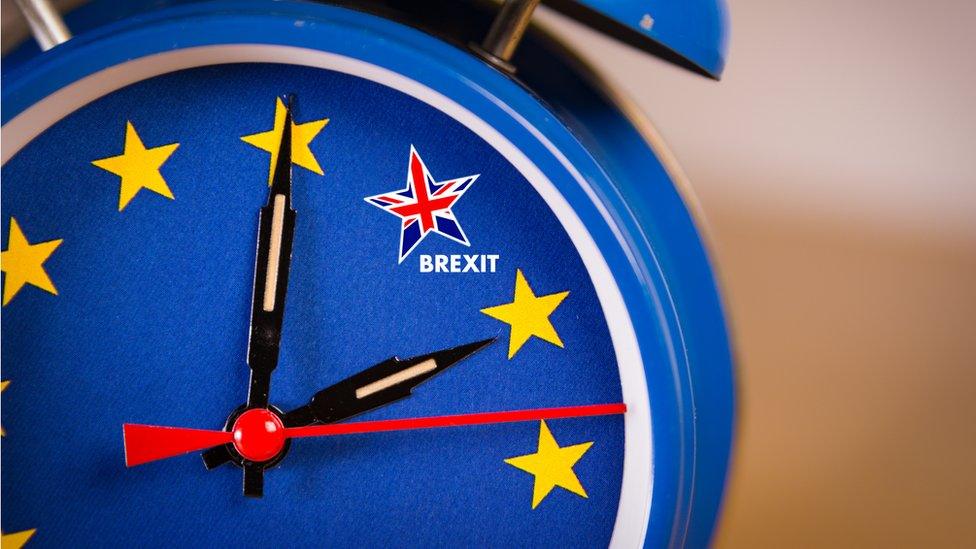
Deaf ears
Earlier this week, responding to the controversy around the tactics being used by the UK government to ensure its Brexit policy is implemented at the end of October, a response came from Liz Cameron, chief executive of the Scottish Chambers of Commerce.
She said: "Businesses in Scotland feel as if their pleas for a return to political sanity are falling on deaf ears as this dangerous game of Westminster brinkmanship escalates.
"Continuing political turbulence is taking a measurable toll on contracts, on investment decisions and on business confidence.
Dr Cameron added: "Government support is essential to creating the right environment for businesses to thrive and this effort is currently, at best, increasingly haphazard."
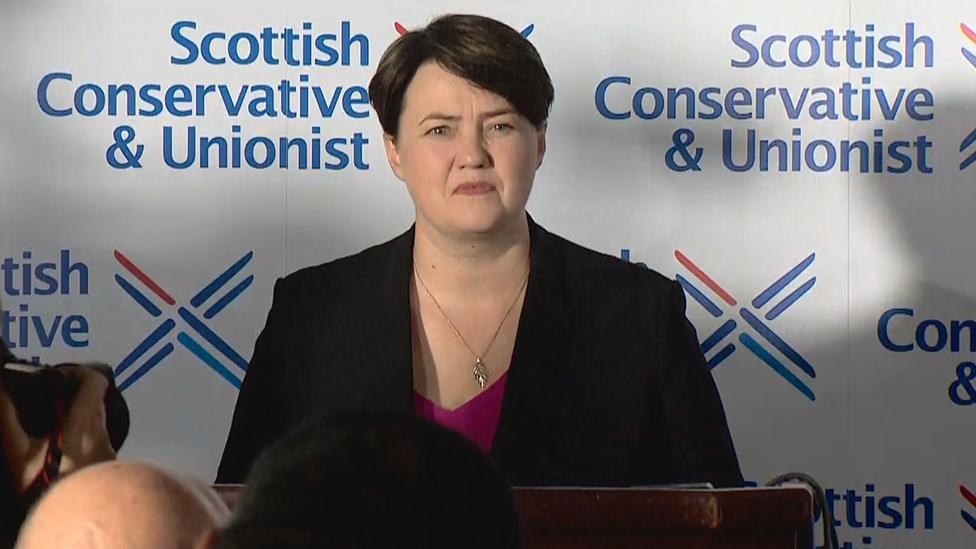
Ms Davidson announced her resignation in Edinburgh on Thursday morning
Staunch friend
And then there's Ruth Davidson. Business organisations reckoned they had a listening ear in her office.
So from the Federation of Small Businesses, there's dismay at the Scottish Tory's leader's departure.
Andrew McRae, the Federation's policy chair in Scotland, responded: "It is more than disheartening that Scottish frontline politics is losing a straightforward, pro-business voice like Ruth Davidson's, especially during this period of turmoil.
"She has been a staunch friend of the FSB during, and before, her tenure as leader. We fully understand and respect her reasons for stepping back from the forefront of politics, but many will miss her contribution to Scottish public life."
And that is a reminder of how things used to be between Tories and business. It's not clear how, how soon, or if, that oft-defining relationship in British politics and its economy will return to business as normal.
- Published29 August 2019
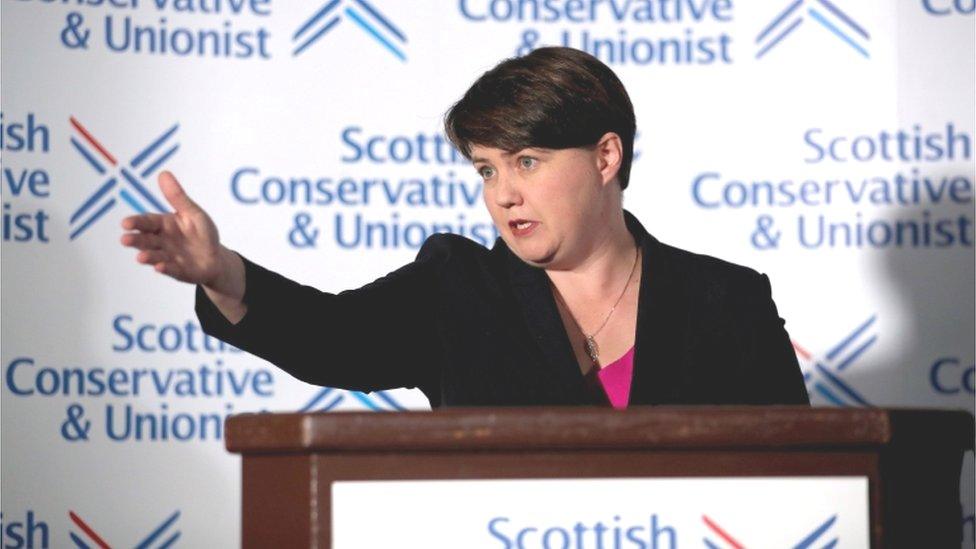
- Published3 July 2019

- Published29 August 2019

- Published29 July 2019
